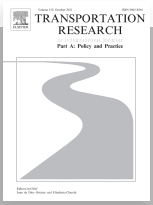The Causes and Consequences of Curb Parking Management
Abstract
The curb is a monopoly good: it is network infrastructure owned entirely by cities. Unlike most network infrastructure, however, it is not managed primarily by prices. Cities instead allocate the curb with a confusing patchwork of meters, time limits, permits, and—perhaps most notably—fines. Urban parking thus stands out among network infrastructure for its low level of payment, low level of quality, and large share of revenue derived from punishment. We develop an explanation for why this is so, which emphasizes the curb’s public ownership and low production costs. We then use both qualitative and quantitative methods to examine some of our theory’s implications. We draw on descriptive data from a variety of US cities, but focus primarily on the city of Los Angeles as a case study.
Manville, M., & Pinski, M. (2021). The causes and consequences of curb parking management. Transportation Research Part A: Policy and Practice, 152, 295-307.

